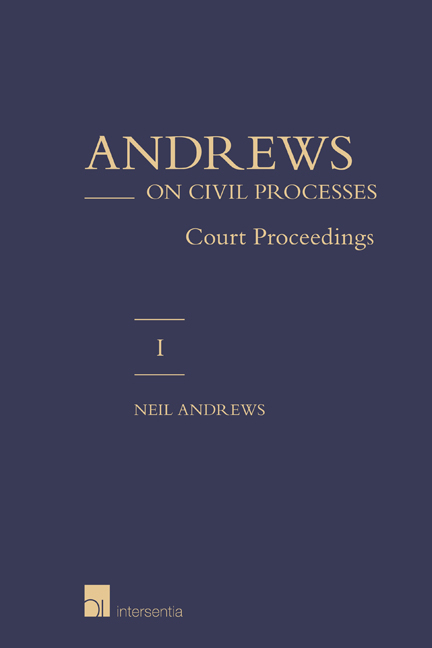Book contents
- Frontmatter
- Dedication
- Epigraph
- Preface
- Contents
- Table of Cases
- Table of Statutes
- Table of Statutory Instruments
- PART I INTRODUCTION TO THE FORMS OF CIVIL JUSTICE
- PART II COMMENCEMENT OF COURT PROCEEDINGS AND PREPARATION FOR TRIAL
- PART III END-GAME: TRIAL, APPEAL, FINALITY AND ENFORCEMENT
- Chapter 14 Trial and Judgment
- Chapter 15 Appeals
- Chapter 16 Finality in Court Proceedings
- Chapter 17 Enforcement of Court Judgments and Orders
- PART IV COSTS AND FINANCING OF LITIGATION
- PART V SPECIAL PROCEEDINGS
- PART VI PRINCIPLES OF CIVIL LITIGATION
- PART VII THE EUROPEAN CONTEXT
- Select Bibliography
- Index to Volumes I and II
Chapter 14 - Trial and Judgment
from PART III - END-GAME: TRIAL, APPEAL, FINALITY AND ENFORCEMENT
Published online by Cambridge University Press: 13 December 2017
- Frontmatter
- Dedication
- Epigraph
- Preface
- Contents
- Table of Cases
- Table of Statutes
- Table of Statutory Instruments
- PART I INTRODUCTION TO THE FORMS OF CIVIL JUSTICE
- PART II COMMENCEMENT OF COURT PROCEEDINGS AND PREPARATION FOR TRIAL
- PART III END-GAME: TRIAL, APPEAL, FINALITY AND ENFORCEMENT
- Chapter 14 Trial and Judgment
- Chapter 15 Appeals
- Chapter 16 Finality in Court Proceedings
- Chapter 17 Enforcement of Court Judgments and Orders
- PART IV COSTS AND FINANCING OF LITIGATION
- PART V SPECIAL PROCEEDINGS
- PART VI PRINCIPLES OF CIVIL LITIGATION
- PART VII THE EUROPEAN CONTEXT
- Select Bibliography
- Index to Volumes I and II
Summary
TRIAL
Trial is important because it is the beginning of the ‘end-game’ of litigation before the courts. Thereafter, provided the claimant has been successful (or the defendant's counterclaim has been upheld), enforcement proceedings might be brought, for example, to obtain satisfaction of a judgment debt. Enforcement is also possible if judgment in favour of the claimant has been obtained by some other means, for example, by summary process or by ‘default judgment’, or judgment has been obtained because a defence has been dismissed following the defendant's failure to satisfy an ‘unless order’, or a ‘consent judgment’ has been entered.
A final judgment on the merits of the case has a binding effect, as between the parties. The topic of ‘finality’, especially res judicata, is part of this ‘end-game’, therefore. Apart from appeals, for which permission is required, English law is opposed to unnecessary re-litigation of the same issues and claim.
But trial is rare. Many actions end without trial. Indeed most disputants do not bring or become embroiled in formal civil proceedings. Of those who do become parties to court proceedings, most do not experience trial, because the case is either settled or a form of summary judgment or dismissal terminates the case before a final hearing. When these mountains of non-litigated disputes and litigated but untried cases are subtracted from the pile, all that remains is a relatively small percentage of cases where a court has pronounced final judgment on the merits, after hearing witness testimony.
Admittedly, the historical centre-piece of the Common Law civil process has been ‘trial’. In the nineteenth century Common Law courts in England, trial was an oral hearing before a judge and jury. In the United States of America civil trial before juries remains a constitutional right. England has been more pragmatic. In modern times, civil trials in England are almost invariably heard by a judge sitting alone without a jury. Jury trial in England is now confined to serious criminal cases (for example, murder, rape, armed robbery) and civil actions for defamation (even here there is the possibility of trial by judge alone), or misconduct by the police (the torts of defamation, malicious prosecution, and false imprisonment).
- Type
- Chapter
- Information
- Andrews on Civil ProcessesCourt Proceedings, pp. 379 - 414Publisher: IntersentiaPrint publication year: 2013

